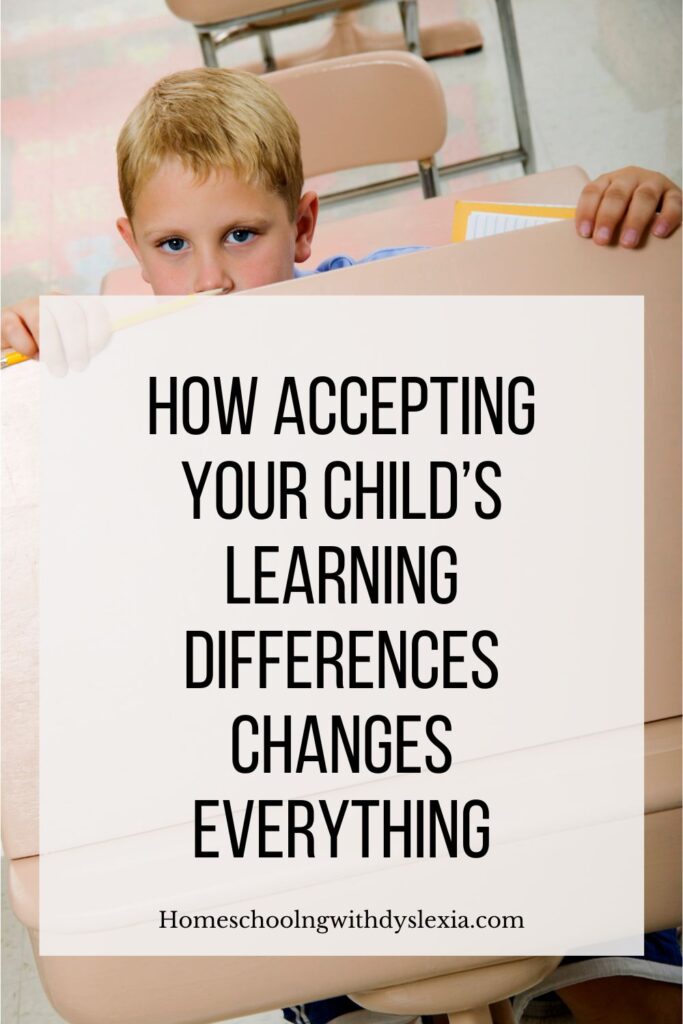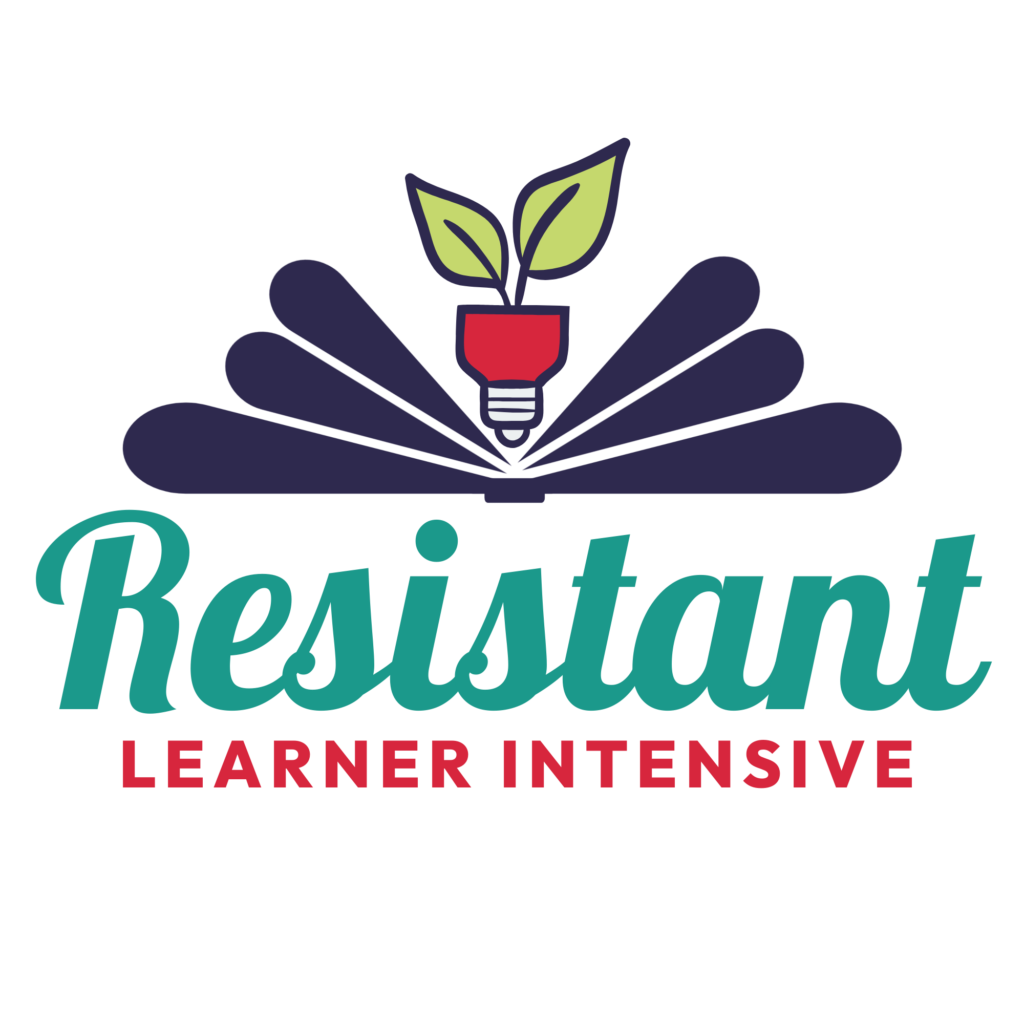As my kids get older and I have finally passed through the 3-ring circus stage of homeschooling a houseful of kids with dyslexia (yes, it will happen, mamas!) I am becoming more and more clear about what is really important when educating our kids – whether they struggle with traditional styles of learning or not. And to this end, I have to say that the simple act of accepting my kids’ learning differences has changed everything.

Prefer to listen to this post? Click the player below:
I guess you could say I have a unique perspective these days after homeschooling nearly 30 years to be able to look back on all those years of trial and error with the massive doubts about what I was doing but then witnessing the victories here and there that added up to homeschool success.
The truth is that many of the things I thought were important while I was teaching and parenting my kids weren’t that important, and many of the things I didn’t think were important, actually were.
Accepting our kids’ learning differences.
Since I am a traditional learner who didn’t struggle much in school, I found it extremely difficult in the beginning to understand why my kids were struggling with learning. Not only that but I had a similar attitude towards their struggles as many school teachers do today; essentially, impatience and unrealistic expectations.
Things like:
“If you would just try harder!”
“Why can’t you remember?”
“Why can’t you pay attention?”
“The other kids are getting this, what’s wrong with you?”
I also dove headlong into the parental blame game:
I was judged; your kids are struggling because of the types of food they’re eating, the amount of time they are on screens, or your parenting style, etc.
A lack of acceptance causes frustration
Their poor memory, their lack of interest in disconnected (traditional) learning, and their slow mastery of what I thought were basic concepts, really frustrated me.
Even when I began to learn about my kids’ dyslexia, I was still focused on fixing them, getting them ‘caught up’, and making them more like traditional learners.
And as life would have it, one by one, I learned that seven of my eight kids had some form of language-based learning difficulty like dyslexia, dysgraphia, and dyscalculia, as well an attention deficits or ADHD with or without hyperactivity.
God knows I’m a slow learner and must have given me all these outside-the-box learners to finally break me from the deficit mindset of thinking that my kids needed to be fixed, to ACCEPTING my kids’ learning as a difference.
This change in mindset had a huge impact on how I looked at, parented, and educated my smart but struggling kids.
Instead of thinking that they had poor memory, I ACCEPTED that they needed more practice.
Instead of being frustrated that they were bored with forced learning of random subjects they had no interest in, I ACCEPTED that people with dyslexia enjoy deeper, more connected and interest-led learning.
Instead of being frustrated and stressed out by their pace of learning (ie. they were always ‘behind’), I ACCEPTED the fact that kids with dyslexia learn language arts on a completely different time table and that that is 100% OKAY!
Acceptance leads to appreciating our kids’ learning differences
I’m so thankful for people like Drs Brock and Fernette Eide of The Dyslexic Advantage who took their advocacy for their own daughter with dyslexia and paired that with their gifts and talents as researchers to dedicate the time to research the advantages of dyslexia.
You can read more about the strengths of dyslexia here and here.
Understanding that the very ‘weaknesses’ found in a person with dyslexia also resulted in some pretty impressive strengths, changed my whole outlook on dyslexia.
Once I began to accept my kids’ learning differences as fact but then also began to appreciate their learning as an advantage, my outlook on educating and parenting them changed dramatically for the good.
Accepting and appreciating lead to accommodating our kids’ learning differences
First, we need to accept or kids learning differences. People do not outgrow dyslexia, they learn to live with it; working with their unique strengths and accommodating any areas of weakness.
An accommodation is anything that helps our kids operate at their intellectual level despite weaknesses in reading, spelling, or writing. There are many areas where our kids may need accommodations including tasks that require memory or executive function skills. Hello ADHD!
Back when I was living in the deficit model, believing that I needed to fix my kids and make them learn like traditional learners, I thought accommodations like listening to audio books, using text-to-speech (or heaven forbid having me write for them!), and modifying curriculum so that they were learning what they needed to learn were all cheating.
Use a math fact sheet to complete your math assignment? No way!
Remove the writing portion of curriculum and discuss the assignment instead? Cheater!
The truth is that when you help your smart but struggling learners to struggle less, they feel more successful. Kids who feel successful feel smart and want to learn!
Learn more about what accommodations are, how to make them in your homeschool, and what accommodations are the best for kids with dyslexia.
The bottom line when it comes to teaching kids with learning differences like dyslexia is this:
The more we deny the facts about why our kids struggle to learn and ignore the many ways in which they excel, we’re going to be up against frustration and eventually kids who think they’re dumb and resist learning.
The sooner we accept, appreciate, and accommodate our kids learning, the sooner they feel smart and successful and our homes and homeschools become the place of acceptance and nurture that they really need to thrive.
The Resistant Learner Intensive
I talk to lots of parents every week. I see how doubts and fears are negatively impacting your homes and homeschools. That is why I created my newest course, The Resistant Learner Intensive (RLI).
In RLI, I walk you step by step through the very steps I took to set myself free from worry about my kids’ futures and the trap of comparing my kids to other homeschool families. Five of my 7 kids with dyslexia and ADHD have graduated from high school and are doing amazingly well!
You will learn about what it looks like to understand and fully accept your kids’ learning differences.
I will help you deconstruct the public school model and see it for what it really is. After that, you are free to take what you want from that model and leave what doesn’t serve you behind.
With this knowledge, we’ll look at teaching methods that really work with our outside the box learners to help them feel smart (which they are) and successful which is incredibly motivating.
Lastly, we’ll look at what I call extreme cases of resistance; school refusal, kids who are super behind, and what to do as our kids near high school and high school graduation to name a few.
In RLI, I share the things that I have learned over the past nearly 30 years of teaching my kids who learn differently that have literally transformed my homeschool from a place of constant stress and overwhelm to one of peace and confidence.
Our kids are smart and capable and want to do well. Once we accept, appreciate, and accommodate our kids, they will relax and naturally move into the areas where they have strengths. This fosters confidence which in turn fosters internal motivation to learn.
How the Resistant Learner Intensive works:

You will receive 4 video teachings via email Monday – Thursday. This includes a note-taking PDF and links to any resources mentioned.
Topics covered are:
Day 1: Understanding and Accepting Your Kids’ Learning Differences
Day 2: Rethinking Traditional Education
Day 3: Learn How to Adjust Your Teaching Methods
Day 4: What to do in Extreme Cases of Resistance
On Day 5 we’ll have a live group question and answer session on Zoom where you can take everything you’ve learned and get practical answers to your questions for your unique family.
There is also an option to add on a discounted 1:1 consulting session with Marianne in addition to the group Q & A if you want more in depth help.
The first teaching video goes out next Monday, March 25th.
Learn more and sign up for the Resistant Learner Intensive here.





0 Comments